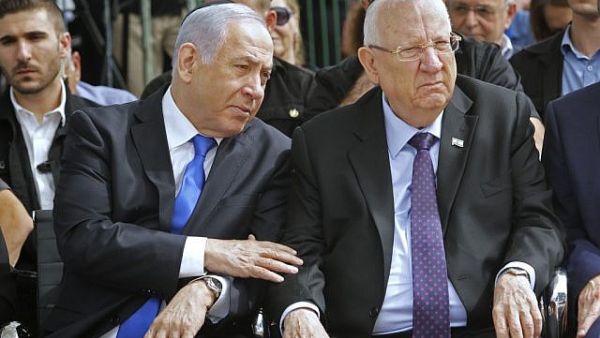By Brian E. Frydenborg
Once again, it seems Israeli voters and parties are fractured just enough to prevent either top candidate and either top party from forming a coalition. Yes, you may hear a lot of talk from different people and parties about forming a coalition, but they seem only ready to demand compromise to form it, not offer it; almost as as soon as they indicate they are willing to work together, they begin complaining about their potential partners.
Once again, Israeli voters are divided and have voted in such a way that there is no clear political way forward to form a government, and the only way to form one is if one or more parties caved in on a core value, person, or position for which they have stood in this election.
Once again, Israeli voters are divided and have voted in such a way that there is no clear political way forward to form a government, and the only way to form one is if one or more parties caved in on a core value, person, or position for which they have stood in this election.
In Israeli’s 120-seat Knesset (or parliament), with final results in, it seems the center-left bloc now has 54, perhaps up to 57 seats (one small Arab party is being finnicky) backing it, the right-wing bloc 55. Additionally, there are 8 seats that are decidedly unaligned. That means no one has hit the magic number of 61.
Source: Haaretz
And that means neither main bloc will have a majority needed to form a government on its own. If no coalition is able to be formed, Israel will soon be forced to hold its third election since this April. This second election, in September, was unprecedented, as never before had an Israeli election failed to produce a governing coalition as was the result of that April election, and it seems Israel will go dramatically further down this new rabbit hole.
Such a situation calls into question the internal political stability of Israel. Yes, Israel has a vibrant multiparty system, no, there won’t be a Jewish Spring, but that doesn’t change the fact that Israel is now merely the latest in a series of democracies, Western or otherwise, experiencing massive political crises.
Yes, Israel has a vibrant multiparty system, no, there won’t be a Jewish Spring, but that doesn’t change the fact that Israel is now merely the latest in a series of democracies, Western or otherwise, experiencing massive political crises.
Both the main parties—Likud (32 seats) led by Benjamin “Bibi” Netanyahu and Blue and White (33 seats) led by Benny Gantz first and then Yair Lapid—are very unlikely to form a “unity” coalition with each other (Gantz for now has said no, and if they do not there is no “unity coalition” whatsoever).
That leaves a rising Yisrael Beiteinu Party (Israel Our Home), led by Avigdor Lieberman, forming something of a no-man’s land in between each main party along with the smaller parties almost certainly to line up behind them, a no-man’s land on some of the major fault lines of Israeli society.
What makes Lieberman such a conundrum is he is a right-winger when it comes to security (he thinks Netanyahu is too soft on Hamas, even in the widely condemned 2014 Gaza military operation Protective Edge) who is as secularist as he is an ethnonationalist and anti-Arab, and often quite vocally.
He and Netanyahu have had a long political relationship, sometimes (and especially in recent years) quite contentious. Lieberman used to be with Netanyahu’s right-wing coalition (was even his Defense Minister) until before the April 2019 election, and his leaving the coalition was what would eventually lead to those April elections being called. Now, since Netanyahu’s coalition is quite dependent on Israel’s religious right—and one of the issues that derailed Lieberman’s participation in Netanyahu’s last coalition was military service for the ultra-Orthodox, which Lieberman and his party want but the religious parties do not—there is pretty much no chance that he would join Bibi and Likud, since they are so attached to the ultra-Orthodox parties. This leaves the right-wing bloc unable to form a majority.
What makes Lieberman such a conundrum is he is a right-winger when it comes to security (he thinks Netanyahu is too soft on Hamas, even in the widely condemned 2014 Gaza military operation Protective Edge) who is as secularist as he is an ethnonationalist and anti-Arab, and often quite vocally.
And yet, since Gantz’s forming a majority absent Likud would require his joining up with a resurgent bloc of Arab Parties running together as the Joint List under Ayman Odeh, there is almost no chance Lieberman would join and, thus, almost no chance of Gantz securing a majority. Even in the event of this extremely unlikely occurrence of Liberman joining Gantz, the idea that the Arab parties would stay with Gantz were Lieberman brought in is also quite far-fetched.
In other words, both Netanyahu and Gantz would have to abandon allies they need to even attract Lieberman and they would lose more support than they would gain. So neither Gantz nor Netanyahu seem able to form a majority of the center-left or the right, respectively.
Perhaps Lieberman will surprise us. Perhaps, too, there will be an Israeli-Palestinian peace deal. Maybe the Trump/Kushner Deal of the Century will earn them the Nobel Peace Prize and include Lebanon, Syria, Yemen, Iran, and Saudi Arabia. All these scenarios are closer to fantasy, though, than reality.
There is talk of a national unity coalition that would see Likud and Blue and White join together, but such talk is cheap and seems super-optimistic in a land in which optimism is in short supply. For one thing, there is little love or specific agreement between the two parties, even if they may agree on some broad outlines, so picturing day-to-day governance under such a coalition is difficult.
both Netanyahu and Gantz would have to abandon allies they need to even attract Lieberman and they would lose more support than they would gain. So neither Gantz nor Netanyahu seem able to form a majority of the center-left or the right, respectively.
Additionally, Gantz, Lapid, and Blue and White would almost certainly demand that Netanyahu would have to be gone in any deal, but that would be tough for Likud to stomach, whose members have wedded themselves to him and who would look weak should they capitulate to such a demand, facing the wrath of their supporters, who seem passionate about Bibi, in any subsequent election.
And if Blue and White allowed Netanyahu to remain in power, that goes against its raison d'être, and for a new party without much passion behind it (when I was in Israel for the April election, not one Blue and White voter I talked to was particularly passionate about Gantz or the party, they just wanted to get rid of Netanyahu) or many specific policies, it could spell its political death as it is mainly an anti-Bibi party and Gantz is mainly an anti-Bibi candidate. Thus, allowing Netanyahu to remain in power would mean Blue and White’s supporters would likely become grossly disillusioned and to desert it, and Gantz has ruled this out, anyway.
allowing Netanyahu to remain in power would mean Blue and White’s supporters would likely become grossly disillusioned and to desert it, and Gantz has ruled this out, anyway.
As usual, media outlets and pundits got far ahead of themselves in declaring Bibi finished, and while the idea of a dreaded third election for many is “that option that shall not be spoken,” it seems fare more likely than a unity government in which both Likud and Blue and White share power or than either main faction forming a government with the dogged Lieberman. Gantz, it must be noted, is pretty much a political novice and won’t have the same skill Netanyahu does in terms of wrangling together a coalition and making deals.
Any promises Gantz would make are risky investments for partners to accept since his ability to deliver has yet to be tested. If anything, the experienced and wily Netanyahu may yet have some deal-making tricks up his sleeve.
Screenshots: Jerusalem Post, Washington Post, New York Times
Much is being made of the Arab parties’ Joint List announcing it will endorse Gantz for Prime Minister (see Sunday afternoon’s “BREAKING” red bar from The Washington Post’s website or the prominent placements on The New York Times’s and The Jerusalem Post’s homepages from the screencaps above), but this has been expected; in fact, all the tallies I have seen have basically included the Joint List in the center-left coalition projected coalition total, giving it fifty-seven seats.
Yet one of the Arab parties in the Joint List grouping, Balad, declined to endorse Gantz for Prime Minister, leaving the number of elected members of the Knesset backing Gantz at 54, one less than Netanyahu’s 55. Gantz’s decision was to essentially punt, declining to pursue a chance to be the first to form a government, which was a blatant admission of the weakness of his position, and Netanyahu has just been given first crack instead as hopes of a unity government were dashed against reality.
Despite some wishful thinking, then, no, Ayman Odeh and the Arabs will not be the kingmakers here, and even talk of Lieberman being a “kingmaker” seems to ignore the realities discussed herein. Lieberman is already making demands that are non-starters for the religious parties and a few members of the religious parties suggest they could work with Gantz but not his party’s co-leader, Lapid. In other words, the individual parties have more reasons not to form coalitions outside their short-of-61-seats blocs than reasons to do so.
Yet Israelis seem to have some sort of expectation that there must be a resolution soon, because, well, this is crazy, they say. They seem to not understand that paralysis and deep, stalemate-ridden division is a distinct possibility, despite the politics of democracies as diverse as Belgium, the UK, the US, Spain, and Italy (just to name five prominent examples) showing this is an increasing norm, currently embodying paralysis, division, and/or dysfunction as their modi operandi.
as the current Prime Minister, Bibi would live to fight another day. Perhaps he has lost the last of his nine political cat-lives, perhaps not, but those who have said his political career is dead already have gotten way ahead of themselves, and it remains to be seen how the criminal cases against Netanyahu will proceed.
Israelis may not want to admit it, but the smart money is on no deal and a third election relative to other possible outcomes. Which means, as the current Prime Minister, Bibi would live to fight another day. Perhaps he has lost the last of his nine political cat-lives, perhaps not, but those who have said his political career is dead already have gotten way ahead of themselves, and it remains to be seen how the criminal cases against Netanyahu will proceed.
The paralysis is perhaps fitting, since Israelis seem so sharply divided in general, as I noted recently. Those hoping this election will have provided answers are just going to have to wait for now, and when the dust settles, Benjamin Netanyahu may yet still be Prime Minister, despite the contrary wishes of roughly half of Israeli voters.
Brian E. Frydenborg is an American freelance writer and consultant. You can follow and contact him on Twitter: @bfry1981







